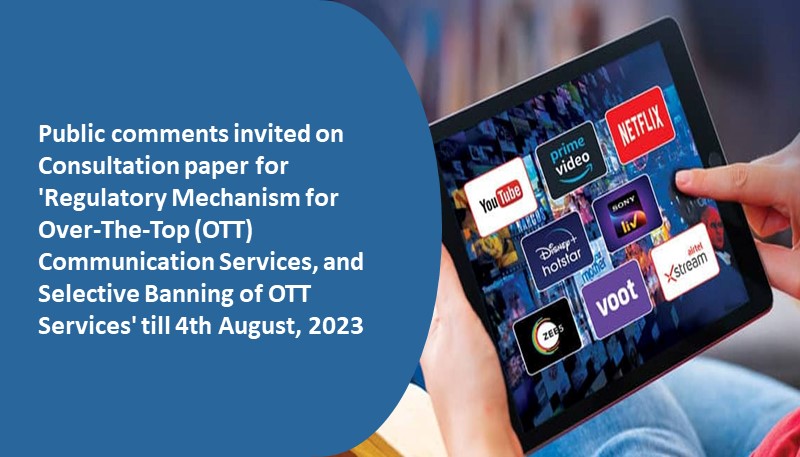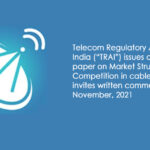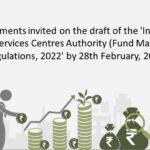The Telecom Regulatory Authority of India (“TRAI”) has invited written comments on the Consultation Paper on “Regulatory Mechanism for Over-The-Top (OTT) Communication Services, and Selective Banning of OTT Services” seeking inputs from stakeholders until 4th August, 2023, with counter-comments invited till 18th August, 2023.
Comments may be sent by email to Shri Akhilesh Kumar Trivedi, Advisor (Networks, Spectrum and Licensing), Telecom Regulatory Authority of India, via email at advmn@trai.gov.in. For any clarification or additional information, please contact Shri Akhilesh Kumar Trivedi, Advisor (Networks, Spectrum and Licensing), at Tel. No. +91-11-23210481.
Comments sought on:
- What should be the definition of over-the-top (OTT) services?
- What could be the reasonable classification of OTT services based on an intelligible differentia? Please provide a list of the categories of OTT services based on such classification;
- What should be the definition of OTT communication services? Please provide a list of features which may comprehensively characterize OTT communication services;
- What could be the reasonable classification of OTT communication services based on an intelligible differentia? Please provide a list of the categories of OTT communication services based on such classification;
- Views on the following aspects of OTT communication services vis-à-vis licensed telecommunication services in India:
- regulatory aspects
- economic aspects
- security aspects
- privacy aspects
- safety aspects
- quality of service aspects
- consumer grievance redressal aspects, and
- any other aspects (please specify)
- Whether there is a need to bring OTT communication services under any licensing/regulatory framework to promote a competitive landscape for the benefit of consumers and service innovation?
- In case it is decided to bring OTT communication services under a licensing/ regulatory framework, what licensing/ regulatory framework(s) would be appropriate for the various classes of OTT communication services as envisaged in the question number 4 above? Specifically, what should be the provisions in the licensing/ regulatory framework(s) for OTT Communication services in respect of the following aspects:
- lawful interception
- privacy and security
- emergency services
- unsolicited commercial communication
- customer verification
- quality of service
- consumer grievance redressal
- eligibility conditions
- financial conditions (such as application processing fee, entry fee, license fee, bank guarantees etc.), and,
- any other aspects (please specify)
- What are the technical challenges in selective banning of specific OTT services and websites in specific regions of the country for a specific period? Please elaborate your response and suggest technical solutions to mitigate the challenges.
- Whether there is a need to put in place a regulatory framework for selective banning of OTT services under the Temporary Suspension of Telecom Services (Public Emergency or Public Safety) Rules, 2017 or any other law, in force?
- In case it is decided to put in place a regulatory framework for selective banning of OTT services in the country,
- Which class(es) of OTT services should be covered under selective banning of OTT services?
- What should be the provisions and mechanism for such a regulatory framework?
- Whether there is a need to selectively ban specific websites apart from OTT services to meet the purposes? If yes, which class(es) of websites should be included for this purpose?
- Are there any other relevant issues or suggestions related to regulatory mechanism for OTT communication services, and selective banning of OTT services?
Background:
In response to a request from the Department of Telecommunications (“DoT”), TRAI has been asked to reconsider its recommendations on the Regulatory Framework for Over-The-Top (OTT) Communication Services and provide suggestions for an appropriate regulatory mechanism for OTTs. This includes addressing the topic of “selective banning of OTT services” as part of its recommendations. DoT has emphasized the importance of conducting a comprehensive examination of various aspects of OTT services, such as regulatory, economic, security, privacy, and safety considerations. This comprehensive approach aligns with the National Digital Communications Policy – 2018, which aims to ensure a holistic and coordinated strategy for leveraging emerging technologies. In light of DoT’s request, TRAI has expressed its opinion that a new consultation process should be initiated to establish a suitable regulatory framework for OTT services.
To gather insights and opinions from stakeholders, TRAI has published a Consultation Paper on the Regulatory Mechanism for Over-The-Top (OTT) Communication Services, and the Possibility of Banning Selective OTT Services on its official website (www.trai.gov.in). Interested parties are encouraged to submit written comments on the issues raised in the Consultation Paper by August 4, 2023, and counter comments by August 18, 2023
A copy of the Consultation paper is linked below for ease of reference.
Source: Telecom Regulatory Authority of India





